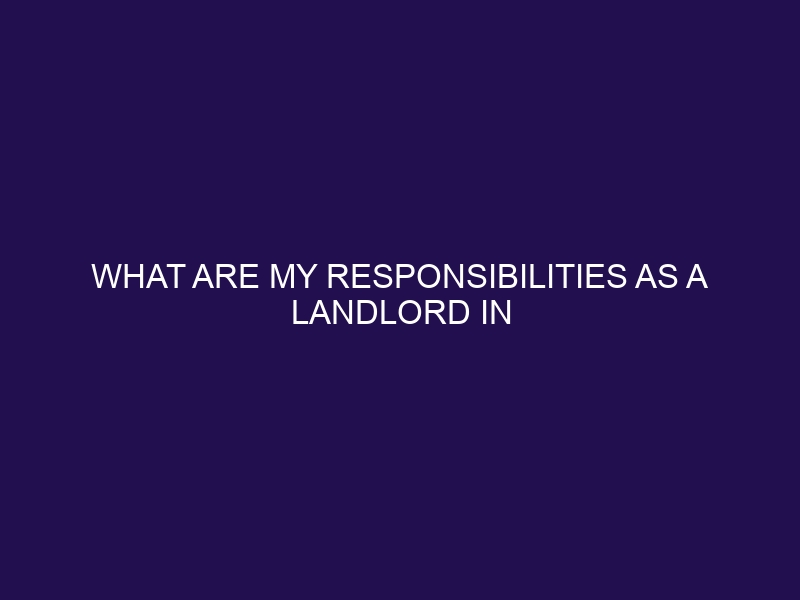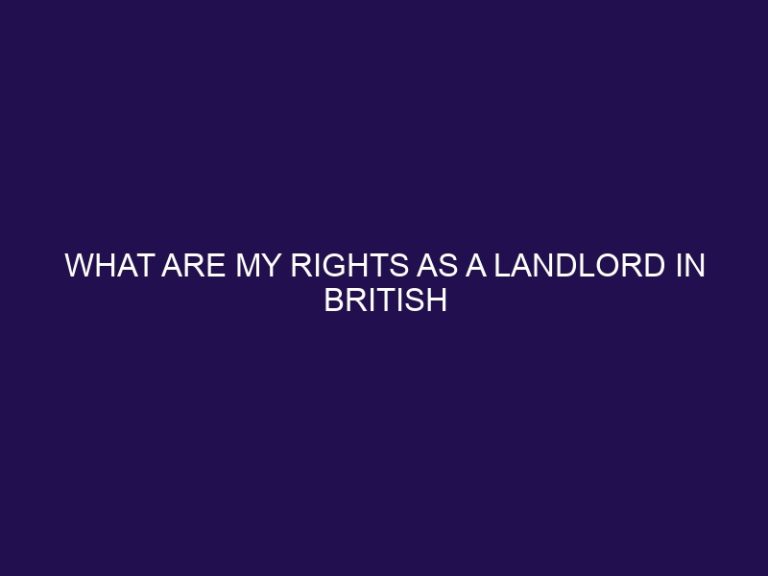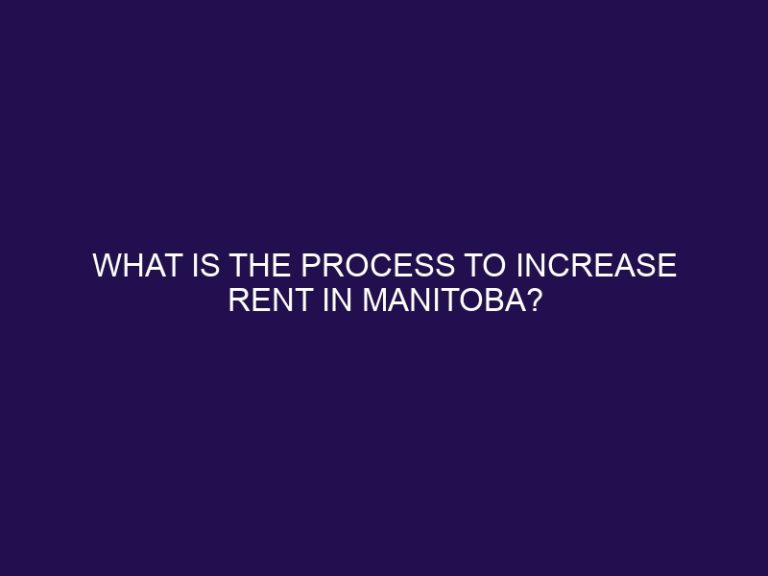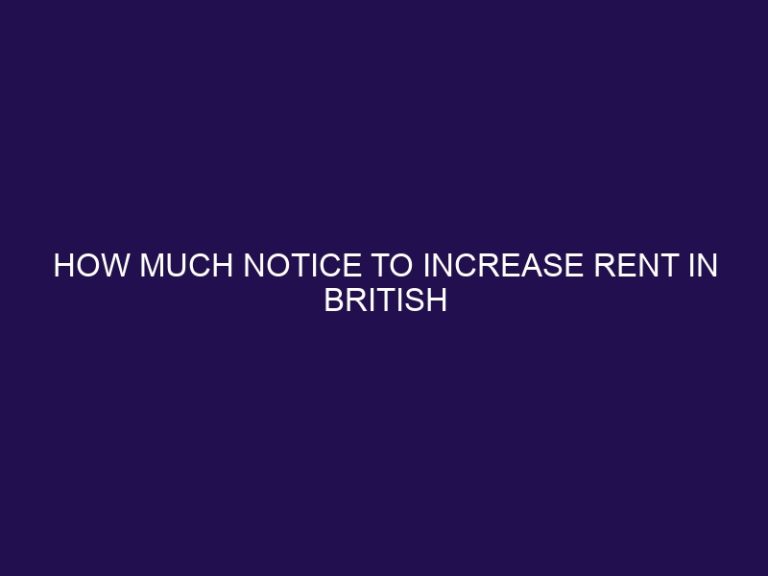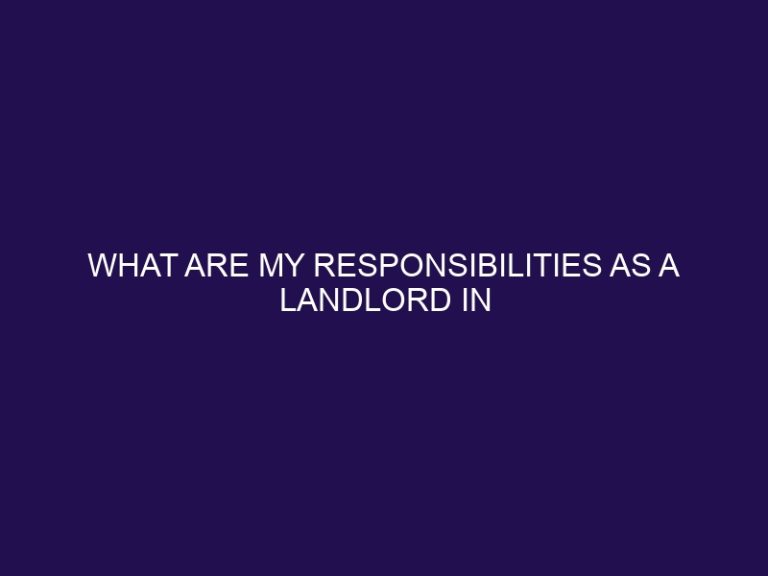What are my responsibilities as a landlord in British Columbia?
.jpg)
Being a landlord in British Columbia comes with certain responsibilities outlined by the Residential Tenancy Act. Whether you are new to the role or an experienced landlord, understanding your responsibilities is crucial to maintaining a positive and lawful landlord-tenant relationship. Here are the key responsibilities you should be aware of:
Responsibilities Before Tenancy:
1. Providing a Safe and Clean Property:
Ensuring that the rental property meets safety and health standards before the tenant moves in.
2. Disclosing Important Information to Tenants:
Informing tenants about any known material facts that may affect their decision to rent the property.
3. Creating a Written Tenancy Agreement:
Drafting a written agreement that outlines the terms and conditions of the tenancy, including rent, payment dates, and any additional rules.
Responsibilities During Tenancy:
1. Maintaining the Property:
Ensuring that the rental unit is in good repair and taking care of necessary maintenance and repairs promptly.
2. Ensuring Quiet Enjoyment for Tenants:
Respecting the tenants’ right to peaceful enjoyment of the rental property and actively addressing any disturbances or conflicts.
3. Addressing Repair and Maintenance Issues:
Promptly responding to repair requests and ensuring that the property remains habitable for the tenants.
4. Handling Rent Increases:
Adhering to the proper procedures and guidelines laid out in the Residential Tenancy Act when increasing the rent.
Responsibilities Regarding Security Deposits:
Understanding and complying with the rules and regulations regarding security deposits, including proper handling and refunding procedures.
Ending the Tenancy:
1. Providing Proper Notice:
Following the regulations regarding the termination of tenancy and providing the required notice period to the tenant.
2. Returning Security Deposits:
Returning the security deposit within a specified timeframe and following the guidelines outlined in the Residential Tenancy Act.
3. Eviction Procedures:
Understanding the legal grounds for eviction and following the proper procedures if eviction becomes necessary.
Taking Legal Action as a Landlord:
Knowing when and how to pursue legal action, such as filing for dispute resolution or seeking a judgment from the Residential Tenancy Branch.
By familiarizing yourself with these responsibilities, you can ensure a smooth and lawful landlord-tenant relationship and protect your rights as a landlord in British Columbia.
Key takeaways:
- Providing a safe and clean property: Landlords in British Columbia have a responsibility to ensure that the rental property is safe, clean, and in a good state of repair.
- Addressing repair and maintenance issues: Landlords are responsible for promptly addressing repair and maintenance issues to ensure that the rental property remains habitable and in good condition.
- Understanding eviction procedures: Landlords should be familiar with the eviction procedures outlined in the Residential Tenancy Act, including providing proper notice and following the legal process when terminating a tenancy.
Residential Tenancy Act in British Columbia
When renting out a property in British Columbia, it is crucial to have a thorough understanding of the Residential Tenancy Act in British Columbia. This legislation specifically outlines the rights and responsibilities of both landlords and tenants. Landlords have the obligation to provide safe and well-maintained premises, respect tenant privacy, and comply with rental increase guidelines as stated in the Residential Tenancy Act. In addition, they are accountable for the maintenance of the property and promptly addressing any tenant concerns. By becoming familiar with the Residential Tenancy Act in British Columbia, landlords can ensure a positive rental experience for all parties involved.
Let me share a real-life anecdote with you: Jack, a landlord in British Columbia, personally experienced the significance of being knowledgeable about the Residential Tenancy Act in British Columbia. He found himself in a dispute with a tenant regarding a security deposit. However, he soon realized that understanding the legislation enabled him to handle such situations more effectively, ultimately leading to the fair and lawful resolution of conflicts.
Responsibilities Before Tenancy
Before welcoming tenants into your property in British Columbia, there are vital responsibilities that must be addressed. From ensuring a safe and clean living space to disclosing essential information, these responsibilities set the foundation for a successful tenancy. Creating a comprehensive written tenancy agreement is crucial to clarify expectations and protect both parties involved. Join us as we explore the essential responsibilities before tenancy, providing valuable insights and guidelines for landlords in British Columbia.
Providing a Safe and Clean Property
| Providing a Safe and Clean Property is Crucial for Landlords in British Columbia |
Landlords in British Columbia have a crucial responsibility to provide a safe and clean property to their tenants. This includes ensuring that the property is free from hazards and meets all relevant safety standards. To fulfill this duty, landlords should conduct regular inspections, promptly address any maintenance issues that arise, and provide necessary repairs when needed.
Furthermore, maintaining a clean property is essential for promoting a healthy living environment for tenants. This can be achieved through regular cleaning practices and proper waste disposal measures. By adhering to these responsibilities, landlords not only protect the well-being of their tenants but also cultivate a positive relationship with them.
Disclosing Important Information to Tenants
In order to establish transparency and maintain trust, it is crucial for landlords to disclose important information to tenants. Here are the key aspects that need to be considered:
- Property details: It is essential to provide accurate information about the property’s condition, features, and amenities, such as heating/cooling systems, appliances, and parking availability.
- Lease terms: Clearly outline the lease duration, rent amount, payment methods, late fees, and any specific rules or restrictions that are applicable.
- Safety and maintenance: It is important to inform tenants about safety measures, including smoke detectors, fire extinguishers, and emergency procedures. Additionally, landlords should disclose any ongoing or planned maintenance or repairs that may affect the tenants’ stay.
- Utilities and additional costs: Specify which utilities the tenant is responsible for and inform them about any additional costs they may incur.
- Neighborhood and community: Provide tenants with information about the surrounding area, nearby amenities, public transportation, and local services.
- Legal obligations: Landlords should disclose relevant legal rights and responsibilities to tenants, including their rights as tenants, eviction procedures, and the process for handling security deposits.
Creating a Written Tenancy Agreement
Creating a Written Tenancy Agreement is an essential step for landlords in British Columbia. It helps protect the rights and responsibilities of both the landlord and the tenant. Here are the key steps involved in creating a written tenancy agreement:
-
Include the names and contact information of both parties.
-
Specify the rental property’s address and description.
-
Outline the duration of the tenancy, including the start and end dates.
-
Clearly state the amount of rent and the payment schedule.
-
Include details about any security deposit, pet deposit, or other fees.
-
Specify the responsibilities of both the landlord and the tenant regarding maintenance, repairs, and utilities.
-
Include any additional terms, such as restrictions on smoking or subletting.
-
Create provisions for lease termination or renewal.
By following these steps and incorporating them into a written agreement, landlords can ensure clarity and protection for both parties involved in the tenancy.
Responsibilities During Tenancy
As a landlord in British Columbia, understanding your responsibilities during a tenancy is crucial for a smooth and successful rental experience. In this section, we’ll dive into the key aspects of your role, covering everything from maintaining the property and ensuring quiet enjoyment for tenants to addressing repair and maintenance issues and handling rent increases. With these insights, you’ll be equipped to fulfill your obligations as a landlord and maintain a positive landlord-tenant relationship.
Maintaining the Property
- Ensuring Proper Property Maintenance: Maintaining the property as a landlord in British Columbia is crucial for the comfort and safety of tenants. Here are some important steps to follow:
- Regular Inspections: Conduct routine inspections to identify any maintenance or repair needs.
- Addressing Repair Needs Promptly: Timely repairs should be addressed promptly to ensure the property remains in good condition.
- Maintaining the Exterior: Landscaping should be kept up to create a pleasant living environment.
- Prioritizing Security: Install and maintain proper security measures, such as locks and lighting, to ensure tenant safety.
- Ensuring Cleanliness: It is important to keep the property clean and well-maintained, including common areas, to provide a comfortable living space.
- Regular Appliance Maintenance: Regularly servicing and maintaining appliances is necessary to ensure they are in good working order.
- Scheduling Regular Maintenance Tasks: It is advisable to schedule regular maintenance tasks, such as cleaning gutters and inspecting HVAC systems, to prevent any potential issues.
By following these steps, landlords can fulfill their responsibility of maintaining the property and provide a positive rental experience for tenants.
Ensuring Quiet Enjoyment for Tenants
Ensuring Quiet Enjoyment for Tenants
In British Columbia, ensuring quiet enjoyment for tenants is a paramount responsibility for landlords. To promote a peaceful living environment, landlords should consider the following key points:
- Respect noise regulations: It is crucial for landlords to guarantee that both the property and its residents comply with the noise regulations established by local authorities.
- Maintain the property: Regular maintenance plays a vital role in preventing issues like noise caused by faulty appliances or structural problems.
- Resolve disputes: Landlords should promptly address tenant complaints regarding noise disturbances originating from other tenants or external sources.
- Communicate expectations: By providing clear guidelines on noise levels and acceptable behavior, landlords can help tenants understand and respect the necessity of quiet enjoyment.
- Enforce lease agreements: If needed, landlords should take appropriate action, suchem> as issuing warnings or enforcing consequences, to deal with noise-related violations of the lease agreement.
Addressing Repair and Maintenance Issues
When it comes to addressing repair and maintenance issues as a landlord in British Columbia, it is crucial to address the issues promptly to prevent further damage and maintain a good relationship with tenants. Evaluate the repair needed and determine whether it falls under the landlord’s responsibility or the tenant’s responsibility. If the repair requires expertise, hire qualified professionals to carry out the necessary repairs. Keep records of all repair requests, expenses, and communication with tenants regarding repairs to ensure transparency and accountability. Familiarize yourself with the Residential Tenancy Act in British Columbia to understand your legal responsibilities and obligations as a landlord concerning repair and maintenance issues. Additionally, regularly inspect your property to identify any maintenance needs before they become major issues. This proactive approach can save you time and money in the long run.
Handling Rent Increases
When handling rent increases as a landlord in British Columbia, it is crucial to abide by the regulations outlined in the Residential Tenancy Act. It is essential to provide written notice to the tenant at least three months before the increase takes effect to ensure transparency. Furthermore, the amount of the increase must be fair and within the limits set by the Act to maintain a harmonious landlord-tenant relationship. It is worth mentioning that increases can only take place once every 12 months. In the event of a dispute regarding the increase, tenants have the right to apply for dispute resolution. Therefore, it is vital to approach rent increases with open communication and honesty, fostering a positive environment for both parties involved.
Responsibilities Regarding Security Deposits
When it comes to handling security deposits, landlords in British Columbia have specific responsibilities. It is crucial to understand these responsibilities in order to maintain a smooth landlord-tenant relationship and avoid any legal issues.
- Receipt: It is important for landlords to provide tenants with a receipt for the security deposit as proof of payment.
- Deposit Storage: Landlords must hold the security deposit in a separate trust account and are prohibited from using it for any other purpose.
- Inspection: Landlords should conduct a move-in inspection alongside the tenant to document the condition of the rental unit and make note of any damages.
- Interest: Landlords are required to calculate and pay interest on the security deposit annually at the specified rate set by the Residential Tenancy Branch.
- Return: Within 15 days of the tenancy’s end, landlords must return the security deposit to the tenant, along with an itemized statement of deductions if any damages were incurred.
Ending the Tenancy
When it comes to ending a tenancy in British Columbia, landlords have specific responsibilities to fulfill. In this section, we’ll explore the key aspects of ending a tenancy, including providing proper notice, returning security deposits, and navigating eviction procedures. Get ready to dive into the crucial details that landlords in British Columbia need to understand when it comes to wrapping up a tenancy agreement.
Providing Proper Notice
Providing proper notice is of utmost importance when terminating a tenancy as a landlord in British Columbia. The Residential Tenancy Act mandates specific guidelines to ensure fair treatment of tenants. When providing notice, it is crucial to strictly adhere to the required timeframes and methods of delivery. For month-to-month tenancies, it is typically necessary to serve a written notice of at least 60 days. It is highly recommended to either send the notice via registered mail or personally deliver it to the tenant. Additionally, it is advisable to retain copies of the notice and any correspondence for future reference. This practice promotes transparency and helps prevent potential conflicts.
Returning Security Deposits
Returning security deposits is a vital obligation for landlords in British Columbia. Ensuring a just and transparent process necessitates following the proper procedures. Landlords are required to assess the rental unit for any damages that exceed normal wear and tear. If there are no such damages, the security deposit must be returned to the tenant within the specified timeline, typically 15 days after the tenancy ends. In order to maintain a positive landlord-tenant relationship and prevent any legal disputes, landlords should furnish the tenant with an itemized list of deductions made from the security deposit, as well as provide receipts for any repairs or cleaning expenses incurred.
Eviction Procedures
Eviction Procedures in British Columbia entail a series of essential steps that landlords must adhere to in order to lawfully remove a tenant from their property. These steps ensure the protection of both the landlord’s and the tenant’s rights throughout the process. Here is a comprehensive list of the key steps involved in eviction procedures:
- Provide written notice: Commence by serving the tenant with a written notice articulating the grounds for eviction, such as non-payment of rent or violation of the tenancy agreement.
- File an application with the Residential Tenancy Branch: In the event that the tenant fails to comply with the notice, landlords have the option to lodge an application with the Residential Tenancy Branch to initiate the eviction process.
- Attend a dispute resolution hearing: Both parties will have the opportunity to present their case at a dispute resolution hearing, where an arbitrator will make a final decision.
- Obtain a writ of possession: If the arbitrator grants the eviction, landlords are mandated to obtain a writ of possession from the court, permitting them to lawfully regain possession of the property.
- Enforce the eviction: With the writ of possession in their possession, landlords can collaborate with the Sheriff’s Office to physically evict the tenant from the property if necessary.
By meticulously following these eviction procedures, landlords can navigate the process in a just and lawful manner.
Taking Legal Action as a Landlord
Taking Legal Action as a Landlord in British Columbia
Taking legal action as a landlord in British Columbia requires following a specific process to protect your rights and resolve disputes. Here is a step-by-step guide:
|
Fact: Taking legal action as a landlord is a last resort, and most disputes can be resolved through open communication and mediation, ensuring a mutually beneficial outcome for both parties.
Some Facts About Landlord Responsibilities in British Columbia:
- ✅ Landlords in British Columbia are responsible for ensuring that their rental properties comply with health, housing, and safety standards required by law. (Source: Renting it Right)
- ✅ Landlords are generally responsible for repairs and maintenance issues related to the tenancy, including heating, plumbing, electricity, walls, floors, ceilings, locks, keys, access devices, and more. (Source: Renting it Right)
- ✅ Smoke detectors must be installed in rental units where people sleep, and landlords are responsible for their regular maintenance. (Source: Renting it Right)
- ✅ Tenants should notify their landlords in writing as soon as possible when repairs are needed and document their attempts to notify the landlord. (Source: Renting it Right)
- ✅ If the landlord fails to address repair issues within a reasonable period, tenants can apply for a repair order and seek monetary compensation and rent reduction through the Residential Tenancy Branch’s dispute resolution service. (Source: Renting it Right)
Frequently Asked Questions
Question: What are my responsibilities as a landlord in British Columbia?
As a landlord in British Columbia, it is your responsibility to ensure that your rental properties comply with health, housing, and safety standards required by law. You are generally responsible for maintaining and repairing heating, plumbing, electricity, walls, floors, ceilings, locks, keys, access devices, intercoms, light fixtures in common areas, fire doors, fire escapes, smoke detectors, elevators, painting, cleaning the outside of windows, routine yard maintenance, tree cutting and pruning, insect and pest infestations, serious mold issues, and any other items included in the tenancy agreement.
Question: Do I need to clear snow on the rental property?
Yes, as a landlord, you are responsible for snow clearing on the rental property unless there is an agreement with the tenant for them to take on this responsibility.
Question: What should I do if a tenant asks for repairs?
When a tenant requests repairs, it is important to respond promptly. You should document the request in writing and make arrangements to address the repair as soon as possible. Failure to do so may result in the tenant seeking legal remedies.
Question: Am I responsible for yard maintenance on the rental property?
Yes, as a landlord, you are generally responsible for routine yard maintenance, including grass cutting and tree cutting or pruning, unless there is an agreement with the tenant for them to perform these tasks.
Question: Who is responsible for maintaining light fixtures in common areas?
As a landlord, you are responsible for maintaining light fixtures in common areas of the rental property. This includes ensuring that the fixtures are in working order and providing proper lighting for the tenants’ safety.
Question: What should I do if there is a bed bug infestation in the rental property?
If a tenant reports a bed bug infestation, it is crucial to take immediate action. As a landlord, you are responsible for addressing the issue promptly to prevent the infestation from spreading. Failure to do so may result in the tenant being held partially responsible for the treatment costs. Make sure to document the tenant’s report and any steps taken to address the infestation.

